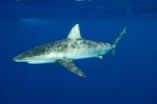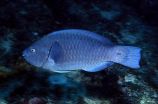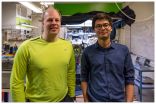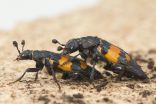Scientists urge Brazilian government to stand strong on aquatic animal protections
In the face of potential conservation setbacks, researchers call for urgent public and private collaboration on fisheries management
2015-03-09
(Press-News.org) SAN FRANCISCO (March 9, 2015) -- A team of Brazilian scientists--including Luiz Rocha, PhD, Associate Curator of Ichthyology at the California Academy of Sciences--is raising awareness about impending conservation setbacks for Brazil's aquatic animals, calling for immediate fisheries management collaboration between the nation's public and private sectors. The scientists say Brazil can transform this moment of political turmoil into positive action--and become a leader among developing countries facing widespread extinction of aquatic fauna. The call to protect the future of Brazil's productive fisheries is published this month in Science.
In December 2014, the Brazilian Minister of the Environment released new national "red lists" identifying 3,286 species of plants and animals threatened with extinction--83 of which are aquatic animals commercially exploited by fisheries. Many of the lists' water-dwelling animals--such as the possibly-extinct Galapagos shark (Carcharhinus galapagensis)--have historically ended up as by-catch during routine fishing operations. The updated red lists seek to strengthen fisheries by naming and protecting species at risk of going the way of the passenger pigeon.
One month after the Brazilian government published updated red lists, roughly 200 fishing boats launched an overnight protest of federal fishing restrictions by blocking Brazil's second-largest container port. The cruise ship Empress, carrying 2,400 passengers and crew, remained stuck in port as the fishermen's union negotiated with government officials. The protest ended when labor union representatives reported an agreement to create a committee of public and private stakeholders to evaluate new catch restrictions. Rocha and his colleagues say the time for increased collaboration on fisheries management is past due.
"In Brazil--a country with some of the most unique aquatic environments on Earth--fisheries data don't really exist," says Rocha. "There are no bag or size limits for any species of fish, and for the past few years, even the most basic fisheries statistics--such as the numbers and weights of fish being caught--are a blank space. Maintaining current red lists is crucial to making sure management plans start as soon as possible."
While the industrial fisheries sector has acted swiftly to derail protections for all threatened aquatic species, the scientific collaborative offers management solutions that protect Brazil's treasured wildlife as well as the financial future of commercial fishing interests. This week's Science article calls the impact of red lists on industrial fisheries "less disruptive" than previously reported, and highlights the opportunity for fishing interests to work with government agencies and the Ministries ?of the Environment and Fisheries and Aquaculture to implement inclusive management plans for a "better way forward."
Scientists stress the importance of annual research-based updates to lists of threatened species, and point to the need for a permanent stock evaluation system to help monitor and reduce the extinction risk for Brazil's legally protected species. The Galapagos shark is an example of a keystone species thought to have been fished to regional extinction due to decades of nonexistent fisheries regulations. This species is one of many that could have greatly benefited from management plans that help reduce by-catch and prevent the overexploitation of fishing stocks.
"This is a crucial moment for fisheries in Brazil," says Rocha. "If we don't act now to protect our aquatic fauna, we may lose a lot of it. Management will only be effective if it is planned and agreed on by all stakeholders."
INFORMATION:
About Research at the California Academy of Sciences
The Institute for Biodiversity Science and Sustainability at the California Academy of Sciences is at the forefront of efforts to understand two of the most important topics of our time: the nature and future of life on Earth. Based in San Francisco, the institute is home to more than 60 research scientists and aquarium biologists, as well as 45.6 million scientific specimens from around the world--nearly 40,000 of which are alive and on display in the Academy's Steinhart Aquarium. The institute also leverages the expertise and efforts of more than 100 international Research and Field Associates and 300 distinguished Fellows. Through expeditions around the globe, captive breeding programs, and investigations in the lab, the institute's scientists strive to understand the evolution and interconnectedness of life. Through these same efforts, as well as through partnerships, community outreach, and public engagement initiatives, the institute aims to guide critical conservation decisions and address the challenge of sustainability. Visit http://www.calacademy.org for more information.
[Attachments] See images for this press release:


ELSE PRESS RELEASES FROM THIS DATE:
2015-03-09
Vildagliptin (trade name Galvus or Jalra) has been approved since September 2007 for adults with type 2 diabetes mellitus in whom diet and exercise do not provide adequate glycaemic control. The German Institute for Quality and Efficiency in Health Care (IQWiG) examined in a new dossier assessment whether this drug offers an added benefit over the appropriate comparator therapy. Such an added benefit cannot be derived from the new dossier either, however, because the drug manufacturer did not submit any suitable data.
Manufacturer itself applied for a new dossier assessment
Neither ...
2015-03-09
Atomic clocks are the most accurate clocks in the world. In an atomic clock, electrons jumping from one orbit to another decides the clock's frequency. To get the electrons to jump, researchers shine light on the atoms using stabilised laser light. However, the laser light has to have a very precise frequency to trigger very precise electron jumps. It is however challenging to get the laser light frequency ultra precise - there will always be a little 'noise'. Now researchers from the Niels Bohr Institute have developed a method that reduces the noise so that it is up to ...
2015-03-09
The drug combination of ledipasvir and sofosbuvir (trade name Harvoni) has been available since November 2014 for the treatment of chronic hepatitis C infection. The German Institute for Quality and Efficiency in Health Care (IQWiG) examined in a dossier assessment whether this new drug offers an added benefit over the appropriate comparator therapy.
IQWiG found a hint a non-quantifiable added benefit for two out of seven patient groups in total: in an infection with genotype 1 hepatitis C virus (HCV) when previous therapies had been unsuccessful, and when previously ...
2015-03-09
HEIDELBERG, 10 March 2015 - An international group of researchers has shown that a regulatory protein involved in controlling how cancer spreads through the body also influences the fate of stem cells in the intestine of mice. The results, which are published in The EMBO Journal, show that the Snai1 protein plays an important role in deciding the fate of intestinal stem cells and the different functions that these cells can adopt.
"Our results show that Snai1 is a key regulator of crypt base columnar cells, a type of stem cell found in the invaginations or crypts that ...
2015-03-09
New research conducted by The University of Manchester has found that GPs' patients can feel alienated by lack of trust, impersonal processes and that this presents problems to improving their safety.
Most research into patient safety focuses on the systems operated by health services. This is particularly focused on hospitals. However, most encounters occur within GP services where relationships between doctor and patient can form a significant part of reaching successful diagnosis and treatment.
The team from the NIHR Greater Manchester Primary Care Patient Safety ...
2015-03-09
Study suggests that millions of modern Asian men are descended from 11 ancient leaders, including Genghis Khan
Sample examined the Y chromosomes of 5,000 Asian men from 127 populations
Historical nomadic and mobile populations allowed for Y chromosomes to be spread far and wide
Geneticists from the University of Leicester have discovered that millions of modern Asian men are descended from 11 powerful dynastic leaders who lived up to 4,000 years ago - including Mongolian warlord Genghis Khan.
The study, which is funded by the Wellcome Trust and published in ...
2015-03-09
Males that mate more often are more insecure about their social status than those mating less, according to new research on the behaviour of burying beetles.
The study, published in the journal Evolution, provides new evidence that the social sensitivity of male behaviour is linked to how often male beetles mate.
Male burying beetles actively compete with each other for access to breeding resources such as dead mice, and when they find a suitable carcass will emit pheromones as a signal to attract females. But the emission of pheromones may also attract other males, ...
2015-03-09
BUFFALO, N.Y. - Although some children emerge from cold and neglectful family environments as adults with high self-esteem, a new University at Buffalo study suggests these people may still be at a relative disadvantage in life, with a foggier sense of who they are.
On the other hand, adults with low self-esteem who grew up in the same type of negative environment actually have relatively high self-clarity, according to the study's findings.
"Our findings show that even those people who manage to get out of that relatively negative time and view themselves as good, worthwhile ...
2015-03-09
Berkeley -- When University of California, Berkeley, bioengineers say they are holding their hearts in the palms of their hands, they are not talking about emotional vulnerability.
Instead, the research team led by bioengineering professor Kevin Healy is presenting a network of pulsating cardiac muscle cells housed in an inch-long silicone device that effectively models human heart tissue, and they have demonstrated the viability of this system as a drug-screening tool by testing it with cardiovascular medications.
This organ-on-a-chip, reported in a study to be published ...
2015-03-09
Chestnut Hill, MA (March 9th, 2015): From "Got Milk?" to "What's in your wallet?" to "Are you a Mac or a PC?" promotional phrases consisting of a simple question have proven to be quite effective, but are they more effective than a simple statement? That depends. Henrik Hagtvedt, Ph.D., a Marketing professor at the Carroll School of Management at Boston College, has just finished investigating what happens when you replace a period with a question mark, or vice versa, and how that affects whether a consumer makes a purchase.
"I've long been interested in ambiguity and ...
LAST 30 PRESS RELEASES:
[Press-News.org] Scientists urge Brazilian government to stand strong on aquatic animal protections
In the face of potential conservation setbacks, researchers call for urgent public and private collaboration on fisheries management




